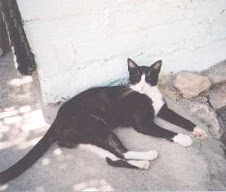Three cats and a black labrador dog from a city suburb have exchanged the home comforts of their neat estate semi for a wild glen on the west coast of Lewis in the Outer Hebrides. Here in the village of Dalmore, their home for the coming weeks will be the "taighean dubha" ( black houses ) of their animal "cousins", houses built with walls six feet thick, thatched roofs, in which man, cows and other sundry animals are housed under the same roof. The contrasts between the city and their holiday destination could not be more stark. During their time in Britain, the islands in the far north and west, such as the Hebrides, were known to the Romans by the designation, "Ultima Thule"; literally the 'ends of the earth'. With a gale blowing the rains in from the sea in mid-July, the Romans understandably did not tarry long exploring these densely forested, unforgiving islands. There is however some evidence ( coins,pottery shards) that the Romans attacked some brochs on the west coast, but this was probably no more than a bit of lively action, ballista practice for their soldiers, in order to alleviate the boredom . So-Sally wondered how the 'bloody' Romans ( Latin: cum sanguine ) got into this story, which the animals thought had been going so well. Fine, so it's back to Dalmore !
The total tally of tails (so to speak) , all the cats and dogs in "Taigh Glass" and "Taigh Shoudie". had agreed to meet this morning, with a view to some adventure, but only if it were dry ( cats don't do rain). It was dry, with the sun promising to show. Some of the other cats and dogs in Dalmore often joined this troop, but unfortunately I can not recall their names . These happy souls met that first morning on "liathad Shoudie" (grassy slope outside No.4) , and as they passed in the road towards the "traigh" (beach), it was obvious the form their adventure would take. Whether man or beast, everyone always spent their first morning on Dalmore's famous golden strand. On their way in the road, they laughed and played, happy to be in each others company again. By now the sun was out, and a few wispy clouds were gently moving across the sky, encouraged by a very light breeze. One could be excused for using the word "Caribbean" to describe the warm, balmy morning on Dalmore beach. The tide was well out, but Fancy, Stowlia and Jura, our "ladydogs", reached the small waves that rippled past their "spogs" only to die away. Floating in the sea further out were bundles of different sea weeds, which powerful waves had torn from the rocks in recent stormy weather. Our Dalmore dogs did a few tastings for Jura to show how tasty and nourishing some sea weeds could be. Jura's favourite was the beautiful red fronds of what is locally called"duileasg" (dulse) - nice and crunchy,and reputedly full of iron and iodine, which they say are "good for you". They headed much further out and went crashing into the high waves,which inevitably carried them back in. They coughed and spluttered and laughed, but they were happy, as happy as ever a dog could be.
The "ladycats" were engrossed in things on the drier stretches of the "traigh", where there were large areas of salt water pools, left behind by the receding tide. There were a number of jelly fish,which Vicky, Tigger and Guinness had never encountered before, and whose dangers were explained by their country cousins. Still, Guinness tentatively touched one with a "spog", which drew a rebuke from Tigger, her self-appointed "mother". There were many other things that the sea had jettisoned on the beach, which were quite safe to examine, and that included a dead sea bird. Unpleasant as this was, it was unlikely to sting you. The dead bird was covered in sand and small jumping flies, and it proved to be an interesting anatomical specimen for our cats to examine. They didn't smell too good on they way home. The lady dogs walked home a good few yards up wind from them. Had they been dogs, instead of cats, "someone" would have suggested a long bath in the "allt". There would be more days like this, weather permitting - but weather has always been a problem in Ultima Thule.
Thursday, 22 October 2009
Subscribe to:
Post Comments (Atom)



No comments:
Post a Comment